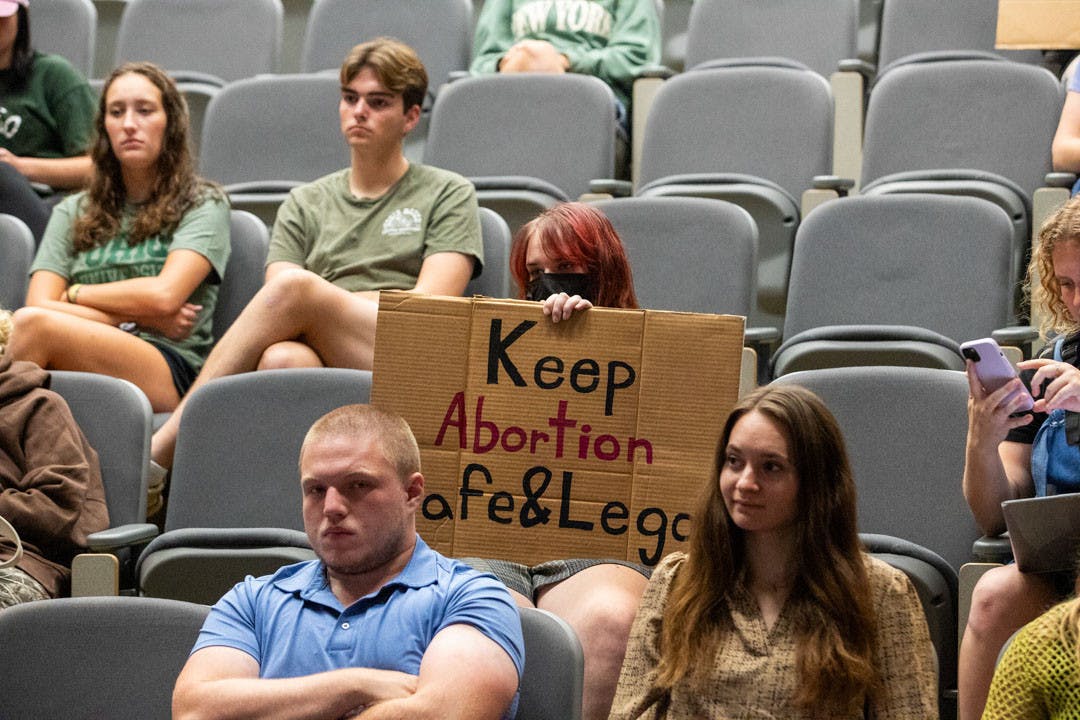A bill proposed in the Ohio House of Representatives in April seeks to prohibit local governments from funding resources that assist a person’s access to abortion. Rep. Josh Williams, R-Sylvania Township, is the primary sponsor of House Bill 475, which had its second hearing Nov. 12.
The House Government Oversight Committee amended the bill to target “elective” abortions, the Toledo Blade reported. “Elective” abortions are considered voluntary and done outside of medically necessary or life-saving reasons.
The American College of Obstetricians and Gynecologists and the American Medical Association Journal of Ethics consider the use of the phrase “elective abortion” harmful. According to the ACOG, “The unnecessary descriptor of ‘elective’ can be used to differentiate between reasons for abortion care and diminish the value of the abortion care that many patients need.”
“This bill has a very simple premise that state tax dollars should not be going toward funding abortion or abortion services that are elective,” Rep. Williams said. “We’re not talking about when the life of the mother is in danger. Essentially, Medicaid currently has the same type of language.”
If passed, HB 475 would require local governments “to report abortion-related spending, and to withhold and reallocate to pregnancy resource centers state local government funds from a county or municipal corporation that engages in such spending,” according to the legislation.
The bill would also create an abortion adjustment fund where the money would be held from the local government fund if those monetary reserves were used for an abortion service, as detailed in the legislation, or if a local government does not file the required report, the Ohio Capital Journal reported.
Danielle Firsich, director of public policy at Planned Parenthood Advocates of Ohio, said pregnancy resource centers, also called crisis pregnancy centers, should not receive more state funds.
“There’s nothing that limits the way that (CPCs) can interact with their patients,” Firsich said. “They’re not even held liable for HIPAA standards. They do not even have to abide by HIPAA standards, which, if you are getting medical care, is incredibly dangerous.”
The majority of CPCs are nonprofits and “nonmedical centers,” according to the Center for Health Law and Policy Innovation at Harvard Law School and an article originally published by Health Affairs Journal, and are typically run by anti-abortion advocates. CPCs may provide certain social services as well as pregnancy tests and ultrasounds.
According to an NBC4 report, Gov. Mike DeWine signed the state’s two-year budget in late June 2023, allocating $14 million to the Parenting and Pregnancy Program. Through the program, the state’s CPCs, of which there are over 200, have been able to receive those funds.
Olivia Barnes and Olivia Kaiser, both juniors studying business and co-presidents of Bobcats for Life, are for HB 475.
“We believe the path to creating a better society is through supporting life,” Barnes said. “(For) the women who are dealing with unexpected pregnancies, the solution we think is providing funding to things like supportive services, pregnancy resource centers (and) the Federally Qualified Health Care Centers.”
Kaiser said she believes PRCs could use more funds through the bill to continue their missions.
“We should be supporting in our taxpayer dollars people that care about people,” Kaiser said. “I think that parenting centers are very good examples of people that care about other people,”
Some people against HB 475 are concerned that it contradicts the decision made by a majority of Ohio voters who voted Nov. 7, 2023, to pass the Right to Reproductive Freedom with Protections for Health and Safety, or Issue 1, giving Ohioans the “right to make and carry out one’s own reproductive decisions.” About 56% of Ohio voters were in favor of the amendment, according to the Associated Press. In Athens County, around 72% of voters voted to pass the amendment.

“(Williams’) argument is that taxpayers don’t support this, citizens don’t support this and that is frankly an absolute lie,” Firsich said. “The idea that voters do not want access to this care or state dollars going to this care is, frankly, a fabrication.”
Rev. Terry Williams is a faith organizer at Faith Choice Ohio, a nonprofit elevating “the moral power of faith communities to expand abortion access and to advance reproductive health, rights, and justice,” according to the organization’s website. As a faith organizer, Rev. Williams helps faith communities and leaders navigate the reproductive health movement.
Rev. Williams is from southern Ohio and said his family has lived in Appalachia for generations, which influenced his role in fighting for reproductive health access because of the region’s history and strength.
“That’s why, when I think about things like this proposed funding ban, it is so fascinating to me that the state wants to come in and tell local communities what we can and can’t fund because that state has decided that they don’t like what we in local communities call priorities,” Rev. Williams said. “We’re going to resist every step of the way in the process.”






